Editor’s Note: This is one essay that you’ll need to read all the way through to the end in order to really appreciate what Ms. Mardou is getting at here. We’re confident that you’ll be glad that you did.
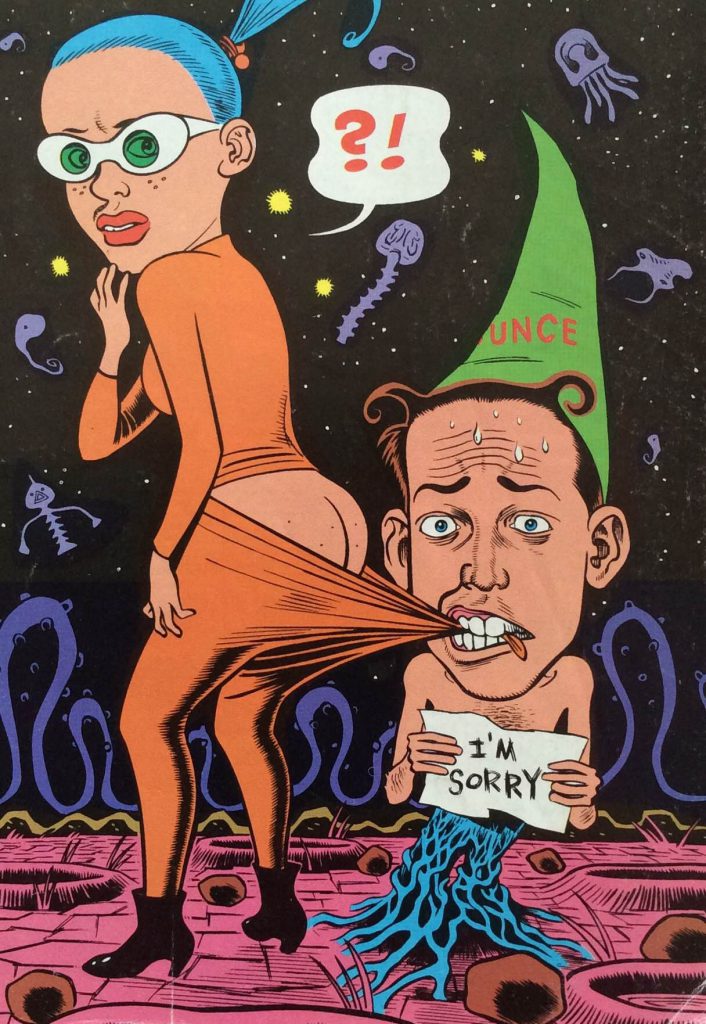
The novelist John Updike (1932-2009) experienced a feminist backlash during his long career. Possessed of laser vision (perhaps aided by his early calling to be a watercolorist and cartoonist) his pen was akin to x-ray on the lives of those smart New England housewives who formed his muse.
The critic Anna Shapiro spoke for a consensus when she opined:
“It was the way he depicted women. It was the way he described them – us. You felt yourself squirming, wanting to pull a blanket over you, preferably lead-lined, to shield yourself from the merest stray phrase or casual observation. Not because they were sexual and incited one’s modesty. It was not like being stripped. It was like being splayed open on the examining table under the glare of medical lamps while satirical remarks were made; it was being seen looming with comic grotesqueness through a telescope; it was the most unfriendly leering by someone saying, You see? You see? How could anyone love that?”
You know, I don’t fully agree. When I first read Updike, in my twenties, these heroines of Updike’s fiction struck a chord. These were not the bland, homogeneous impossibly beautiful ‘Girl-Next-Doors’ of Hollywood or TV. These were ordinary dames: with freckles, graying hair, stretch marks, big hips and fat asses. They could be annoying, or adorable. They drank too much and got sloppy. They were usually married, indulged in affairs on the side, fell in love against their better judgment and even accidentally killed their children sometimes. But somehow, they recovered and held it together like women do. And Updike couldn’t get enough of them. They were interesting in their ordinariness. The men in Updike’s world were equally messy, but seemed to fly apart easier. They spiral out of control, run away, give themselves heart attacks, or resign themselves to sadder, humbled second lives. The outright misogyny perceived by Updike’s contemporaries just didn’t hold true to my mind. It was too complicated to dismiss that easily.
Which brings us to Daniel Clowes. His depictions of women are at times, unflinching (is this how men really see us?)
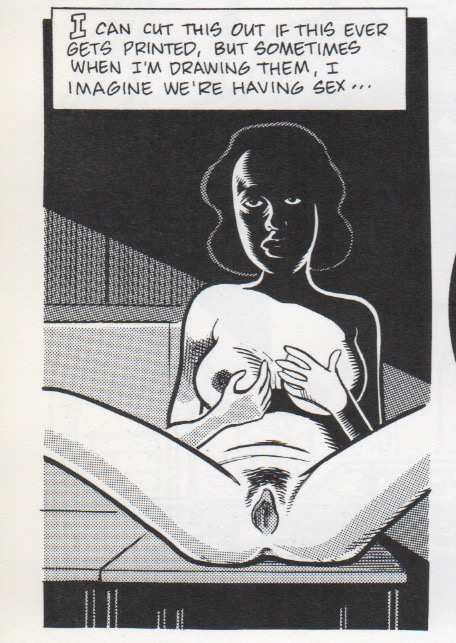
Is this how MY gynecologist unconsciously feels?
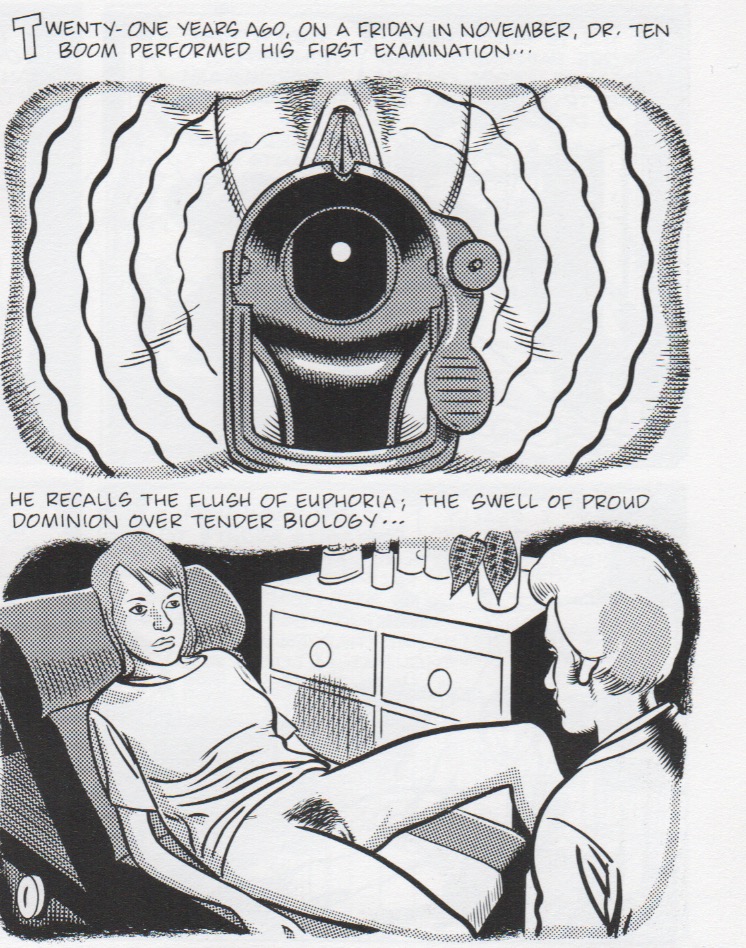
These ‘splayed’ early stories prompted female reader intervention:
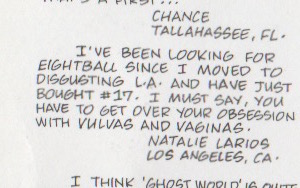
Did Natalie Larios change the direction of Clowes’s work? One can only guess. Well, at any rate, whilst Updike would be followed to the grave by charges of women hating, Clowes gets roasted for outright humanity hating. Here we have from a review of ‘Wilson’:
“Some readers will wonder whether the world really needs another maladjusted, illustrated misanthrope. (See also the work of Adrian Tomine, Ivan Brunetti, Robert Crumb — and Daniel Clowes. Obviously the Oscar-nominated creator of Ghost World, among several other rightly beloved comics, has a way with misanthropy.)”
Neither Updike nor Clowes shied away from the darker underbelly of humanity, but just as I think dismissing Updike’s close inspection of womanhood as misogynistic quite cuts it, nor do I think the misanthropy identified in Clowes’s work is quite on the nose either.
Consider this dark snippet:
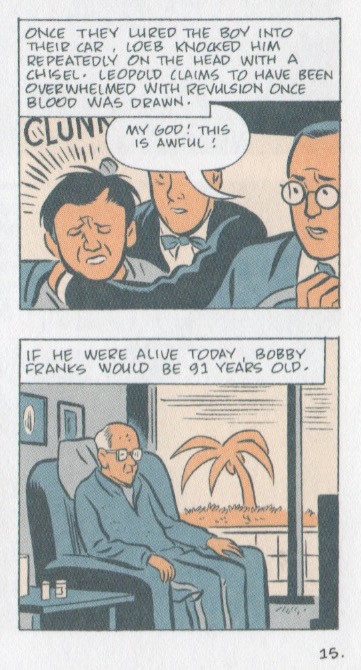
There’s more to this than murder, there’s conscience and awareness of what else could have been. I’m going to argue that Clowes’s comics are shot through with humanity and that the main manifestation of ‘what else could happen’ comes to light through his depictions of women.
I see similarities with Clowes and Updike in so far as they are both known for their precise, finessed detail, their craftsmanship. I should also point out that in comics and literature respectively, Clowes and Updike are both heirs to Vladimir Nabokov’s crown. Both artists cite him as a big influence. Thematically this carries over too. Updike’s notable for his main themes of God, sex and America. What are Clowes’s themes? Sex and America? Sure. God? Well, yes, it’s there. Mortality certainly looms as themes in both men’s work as in Nabokov’s before them.
So let’s start with sex. It’s a preoccupation in Clowes’s work. Many of Clowes’s story feature men who chase their existential need to be mated and they can’t do ‘life’ alone. They are drawn to the power of the Dyad! Clowes, like Updike has created a series of women with so much complex verisimilitude over many years of books. Women are both salve and salvation in the bitter worlds both men paint – at times – so acidly. It’s hard to know where to start, so let’s start with this:
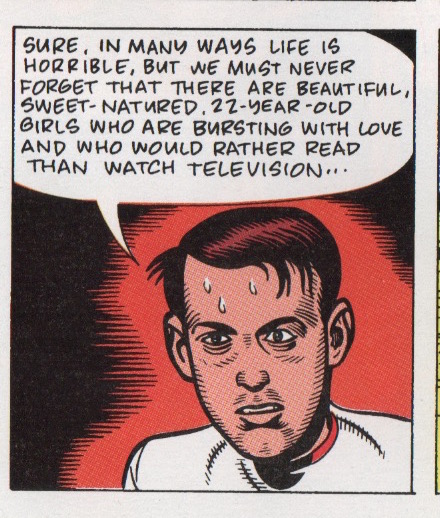
As fate would have it, I was 22 years old myself when I read that for the first time and knowing Clowes to be a little unusual in his definition of ‘beautiful’ it gave my mawkish, raw self a sense of hope!
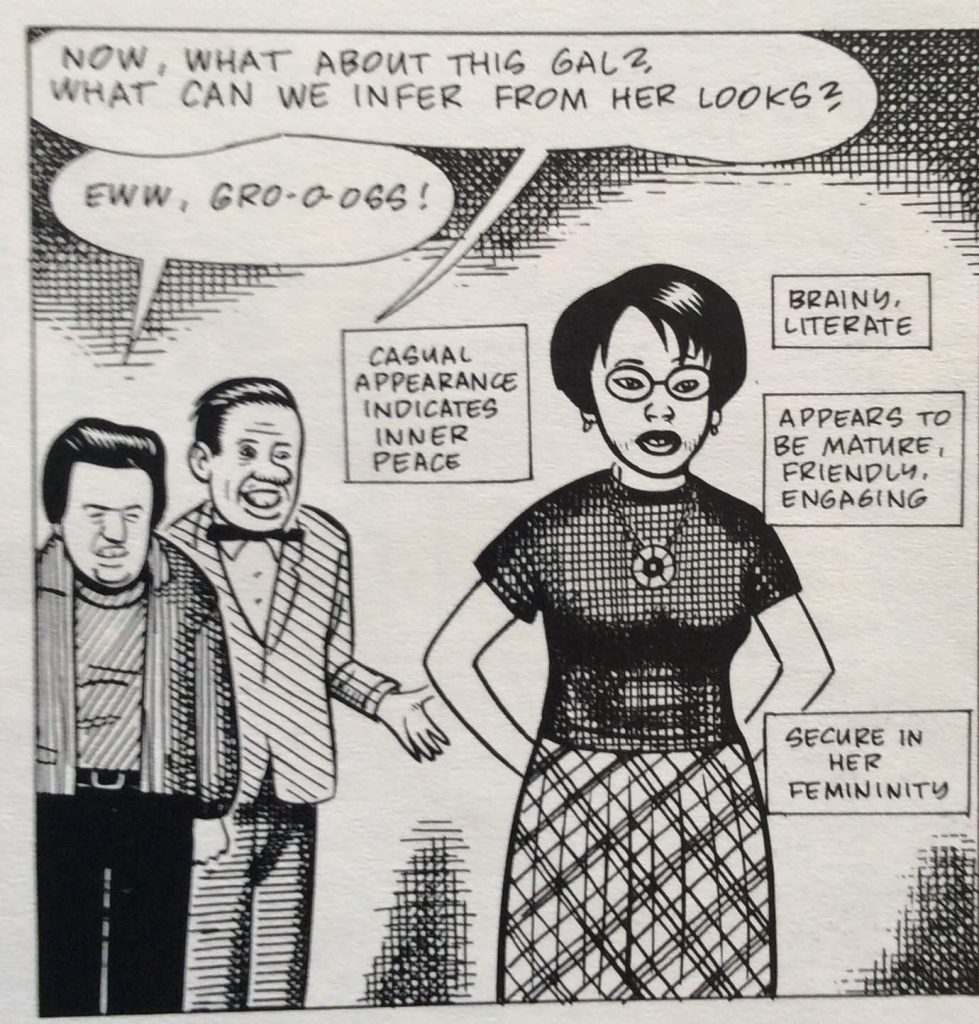
Clowes made another case for ditching the mainstream aesthetic in 1995’s short story, Caricature (Hollywood’s bland actresses are also impossible to draw, so forget THEM) but this goes beyond fashion. Mainstream’s rejects are not just – to his refined mind – physically lovely but they ‘saved him’ according to his most overtly autobiographical story to date:
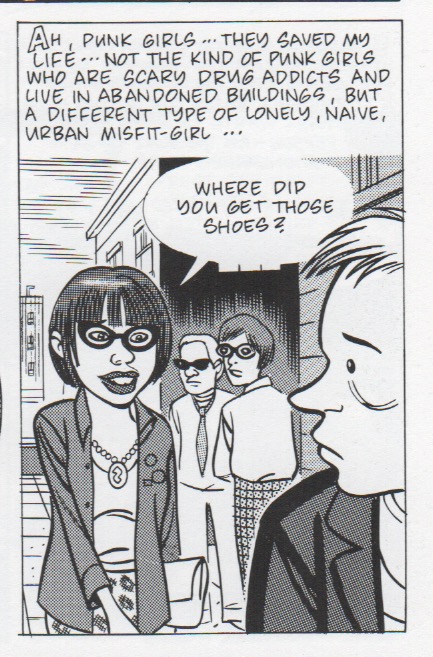
‘A different type of lonely, naïve urban misfit-girl’. I knew this girl! I knew many of her English, 1990s counterparts. This was real to me. And ‘they saved’ his life! Who knew we were that significant? We sure weren’t feeling appreciated at the time. But I digress. Here’s a sentiment we hear repeated over and over in Clowes’s fiction. The women save, rescue and redeem the men. And just the idea of them will do it! Note:
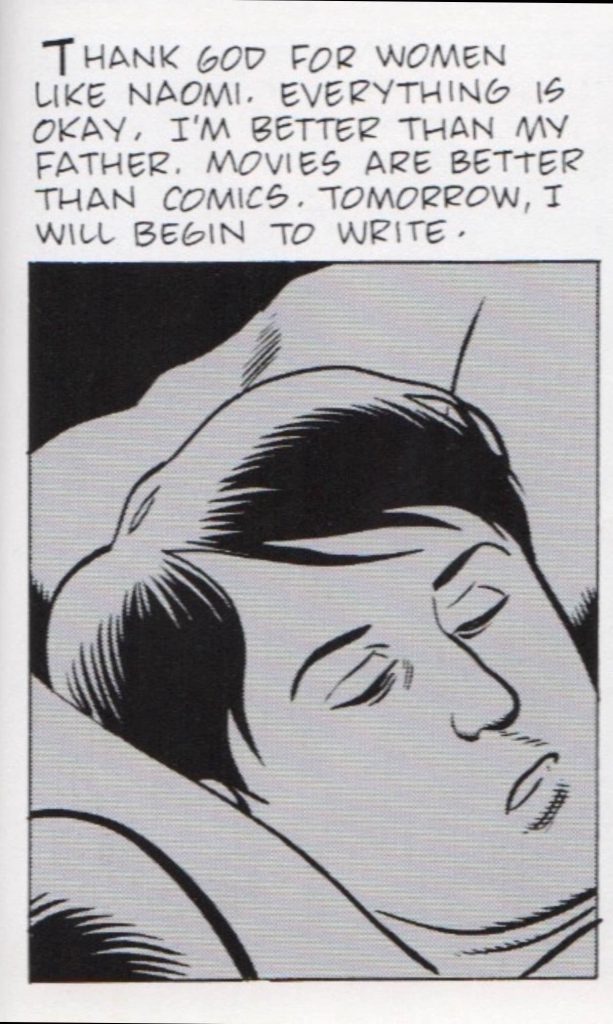
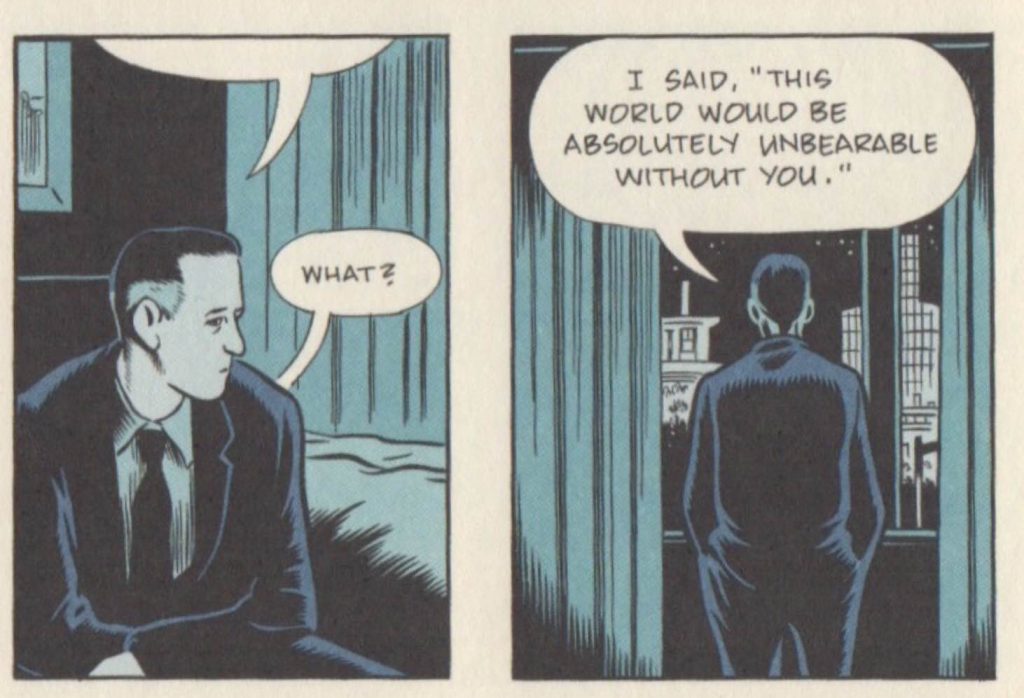
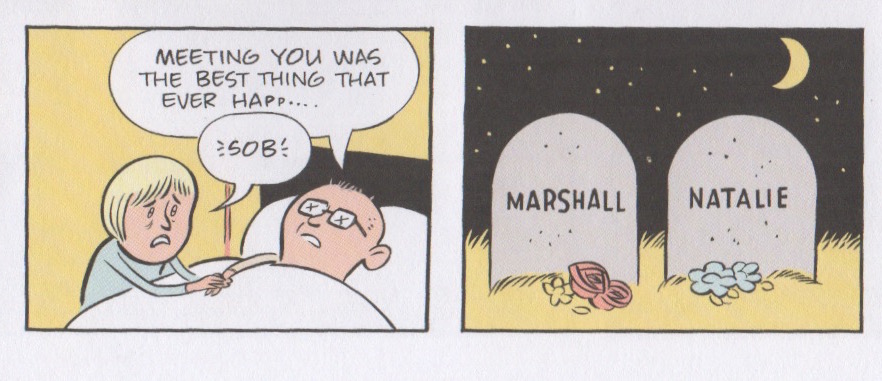
Women are often essential to the well-being of Clowes’s men. Even when they exist in auxiliary, care-taking roles they often get wrapped up in notions of sexual devotion.
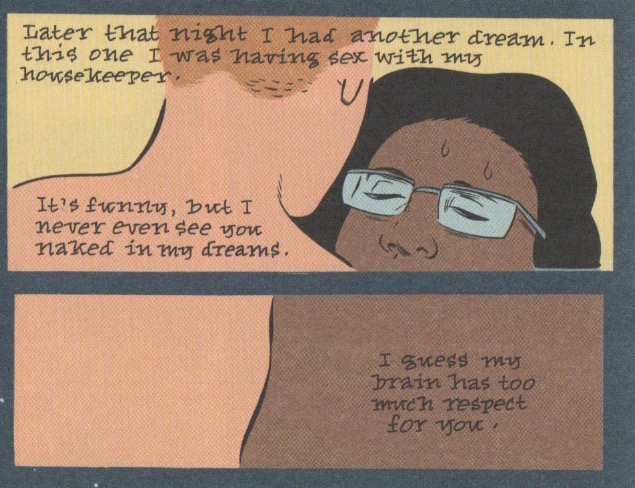
And here David Boring’s one-shot date:
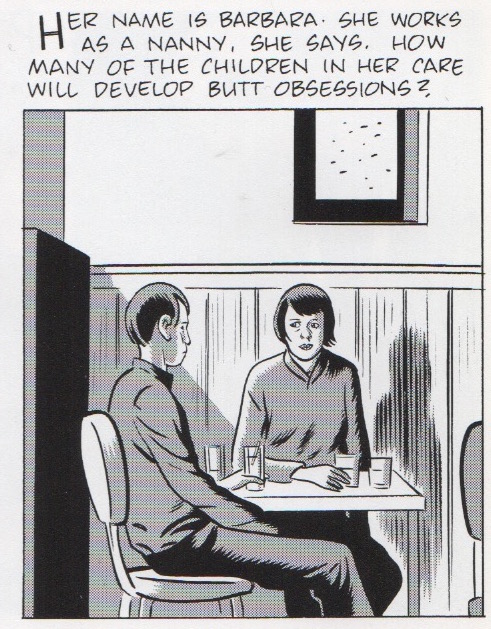
This speaks to a deep need in Clowes’s men folk I think (Please look after me! Please fuck me!). One can only speculate what’s going on with the guys (another time, another essayist!) but this ‘need’ is played out, conversely, when the beloved heroines disappear from view. Like Updike’s heroes who all too readily veer out of control, Clowes shows their lives graphically flying apart on the page. Witness David Boring losing his Wanda:
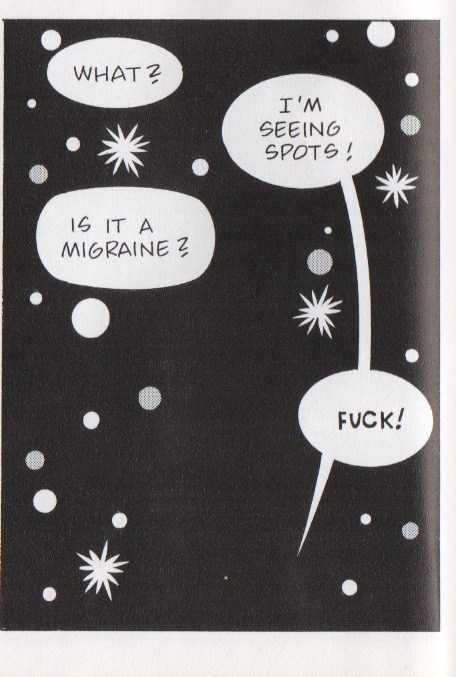
Or Marshall losing Natalie to the night, his world is reduced to abstract geometry:
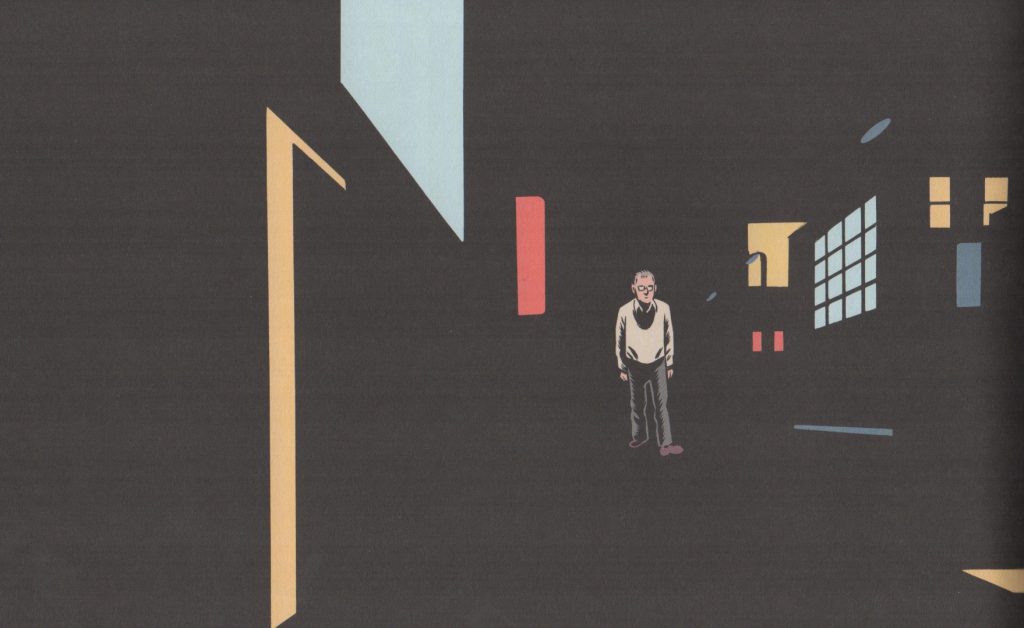
And Jack literally dissolving into organic compounds after losing his girl, Patience.
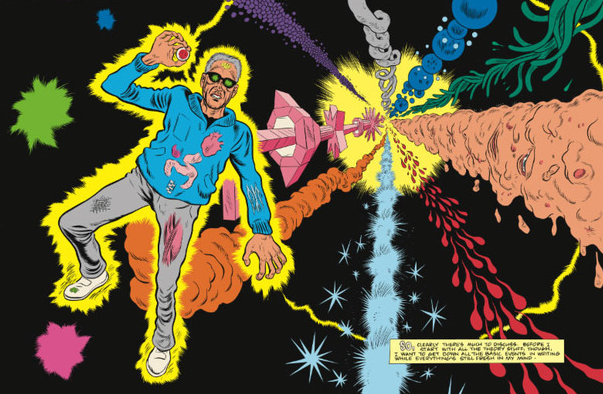
What are we to infer from this? That women are the cosmic glue that hold the balance of humanity together? Perhaps it is something to that effect.
The ever-lurking God of John Updike’s prose is the typical protestant patriarch who must be worshiped and placated by knee-mail and missionary sex positions. Clowes’s stance on God seems a little more no-nonsense:
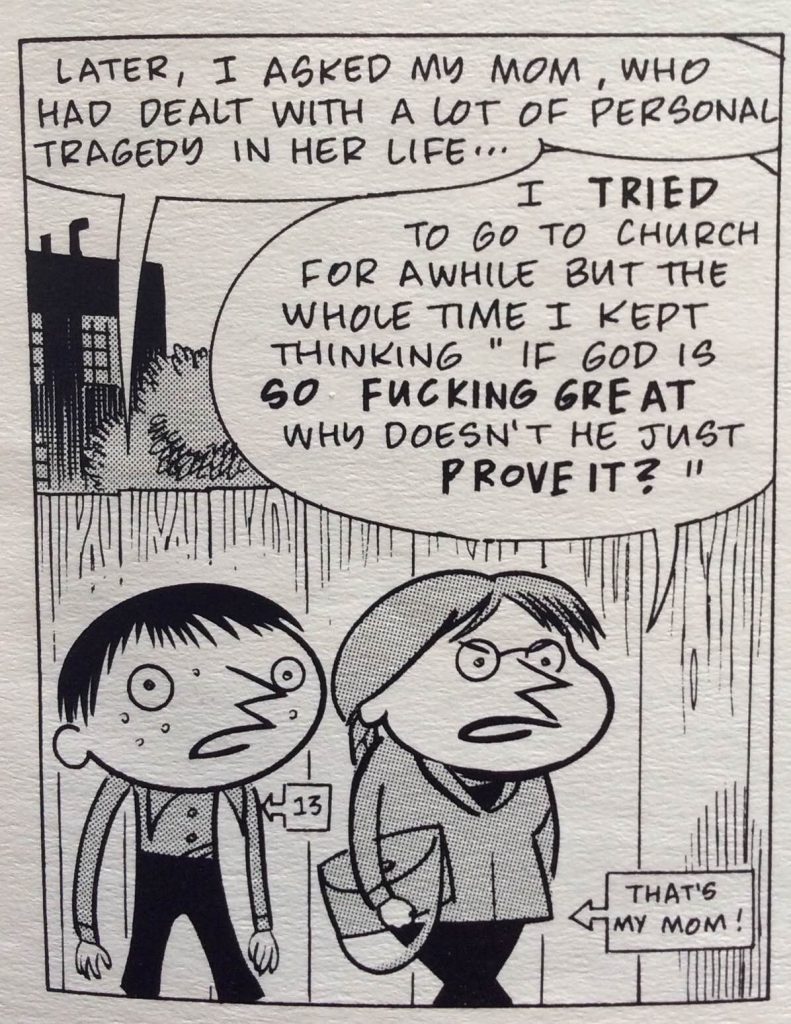
I’d argue that Clowes’s notions of God are a little more aligned with Nabokov’s gnarled McFate. In Invitation to a Beheading Nabokov spares his protagonist’s sufferings in a cruel (not too fictitious) world by removing the veil and dismantling the novel around his head. Clowes takes this tack too with anti-heroes like Epps in stories like Gynecology, in the warped logic of Like a Velvet Glove Cast in Iron and to a lesser extent David Boring, where God mockingly pops up, but we really can’t be sure what exactly is going on (is David already dead for the second two acts? That’s my theory; I mean who survives a bullet to the forehead with such alacrity and vigor?). Well at any rate, Clowes seems happiest deferring the universal questions to the ladies. Here’s Naomi in David Boring (and we already heard from his mom):
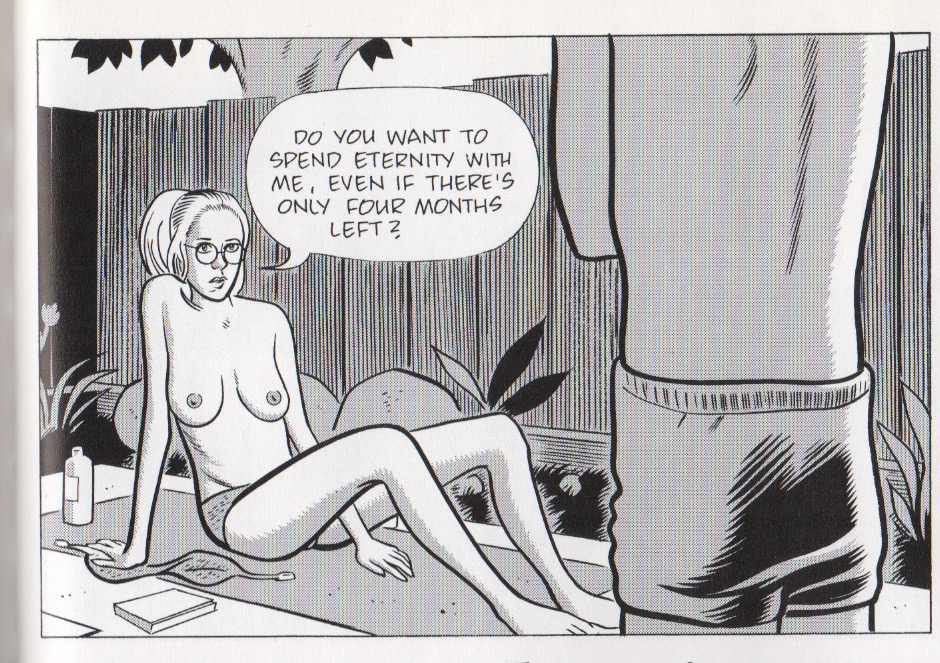
When not retrieving men from the maw of the void, perhaps more powerfully, Clowes depicts women relating to each other. The friendship of Becky and Enid proves to have ‘inter-generational staying power’ according to the Millennial misfit-girl zine, Rookie. Their unwinding friendship crosses the Generation X/Millennial divide speaks to women about their selves, clothes, boys, identity, friendships etc. I like this scene here as it reminds me of my own high school best friend whom I was haplessly willing to shed as she saw right through my grunge girl makeover in 1991/1992.
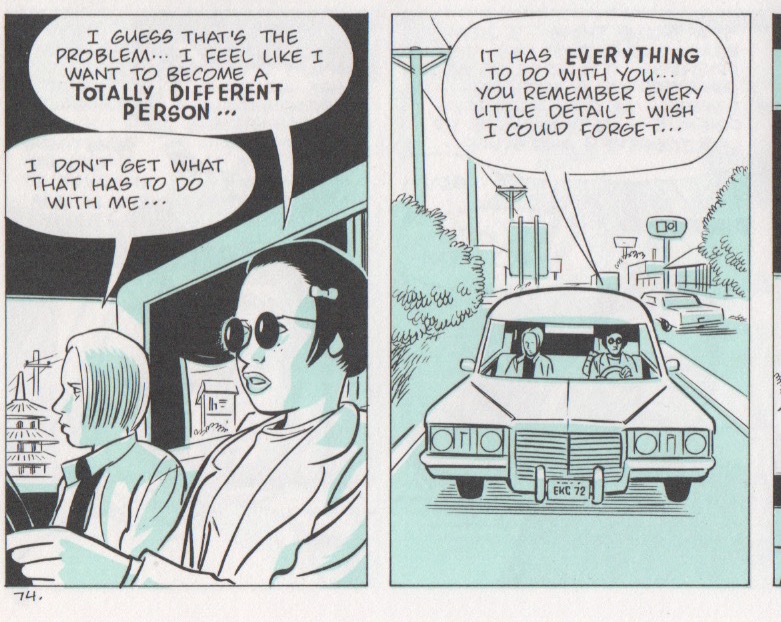
Clowes would tell the Comics Journal in May 2001 that his wife, Erika, being twenty when he met her, did influence the writing of Ghost World to an extent and that, in his own twenties:
“I had a teenage neighbor next door who was this really smart French girl who would always come over and tell me her problems… She was very uncensored and she was really struggling to figure herself out. Enid is mostly, I think, based on a combination of two or three girls I knew in art school.”
Undoubtedly Ghost World’s generation-hopping validity speaks to its ability to ring true. It’s charming, has pathos, and is cutely vulgar and achingly raw. The older I get, the harder I find Nabokov’s Lolita as a book to enjoyably reread, but I think of dear old crummy-toothed Nabokov himself, riding buses in the early 1950s, sitting behind teenagers so as to immortalize their slang and cadence. Ghost World has that ‘interloper’ quality too.
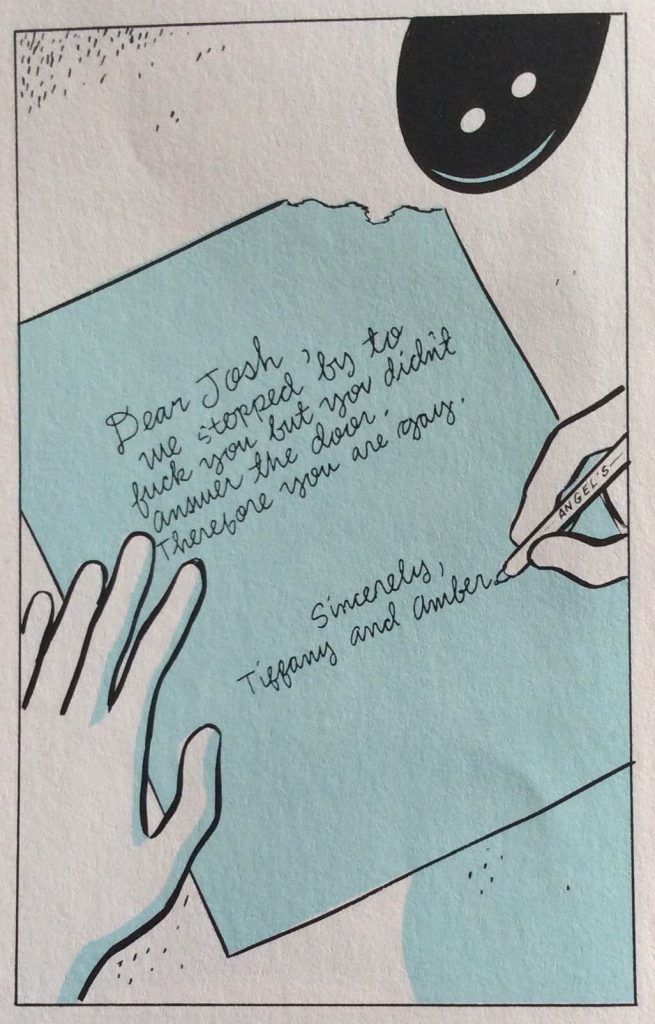
Well, Enid and Becky get a book to themselves, but subsequent young women characters share space in more diversely textured stories. The women of Ice Haven are exceedingly well delineated I think. Vida, this obscure-literature loving, future Hollywood sell-out (uhh? Is that you, Clowes?) is particularly memorable.
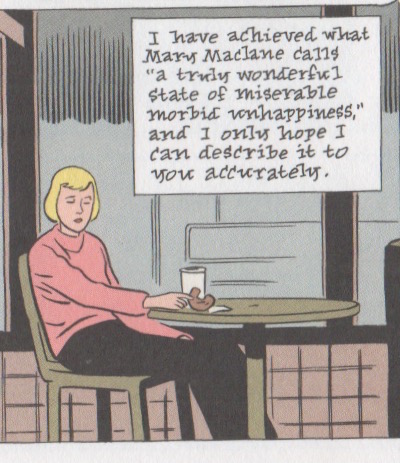
Julie Patheticstein and Violet Vanderplatz are two wronged women who team up in an unlikely friendship. Patience endures a humiliating stage in her development under the kind mentoring of the older waitress, Nancy. And Vida just adores her old grandmother, the fading poetess Ida Wentz. There’s a subtle alter-world of quiet kindness and acceptance in his books and when you look for the women, you’ll find it there. It would be a miserable life for the men if not for this quiet, subplotted influence. Even grumpy-pants Wilson benefits from the tender mercies of his daughter, and then from his life companion, Shelly.
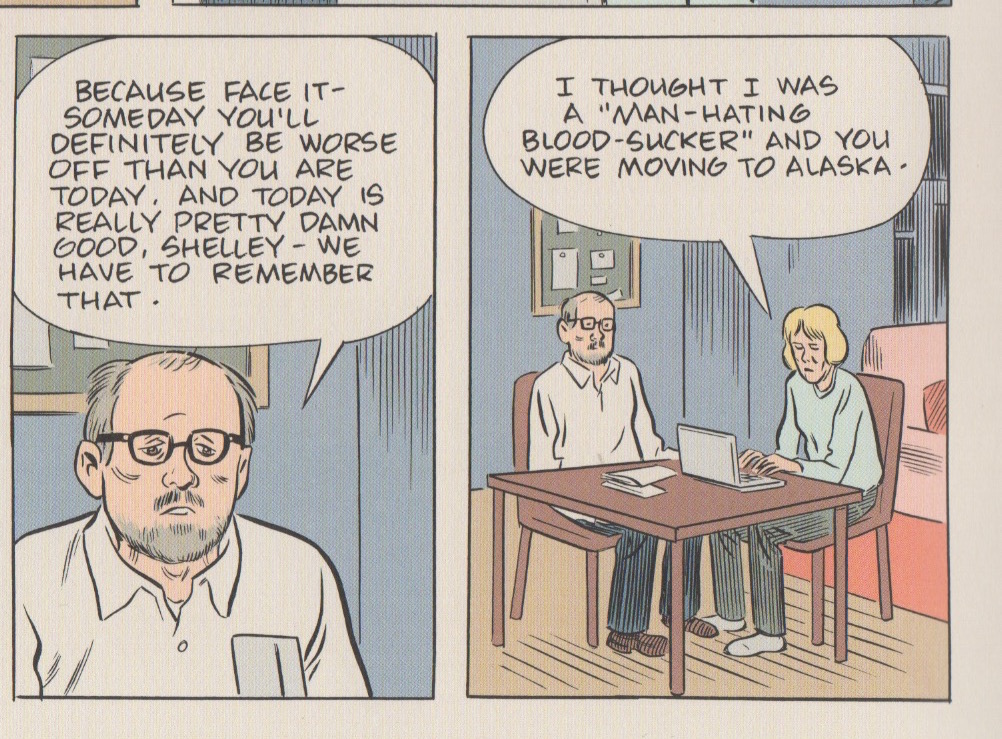
But the women here aren’t just in it for the men’s sake, let’s remember that. Clowes’s most stirring heroines often get to blow the joint at the end. Naomi walks out of David Boring’s warped (after?) life:

We can’t help but note how pathetic and inept David looks next to this smart, deserving woman who packs her bags, vowing to escape the coming apocalypse. Good for her!
Vida leaves for Hollywood:
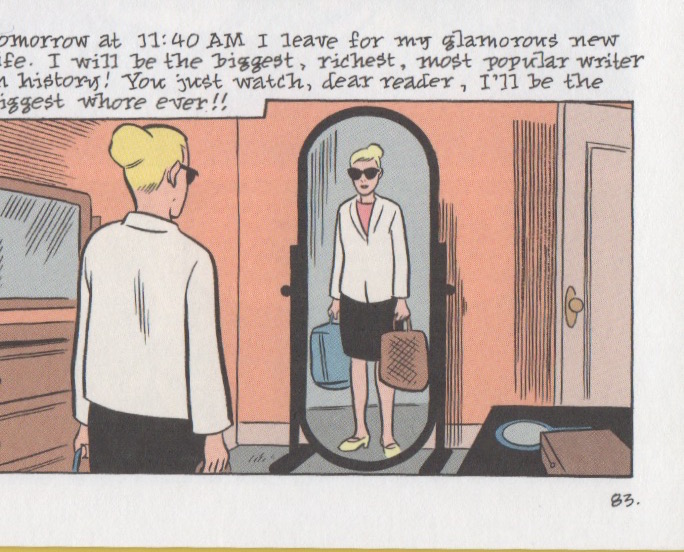
Violet leaves her bullshit non-marriage and step-family behind, and of course Enid is going to get on that bus before the story’s done.
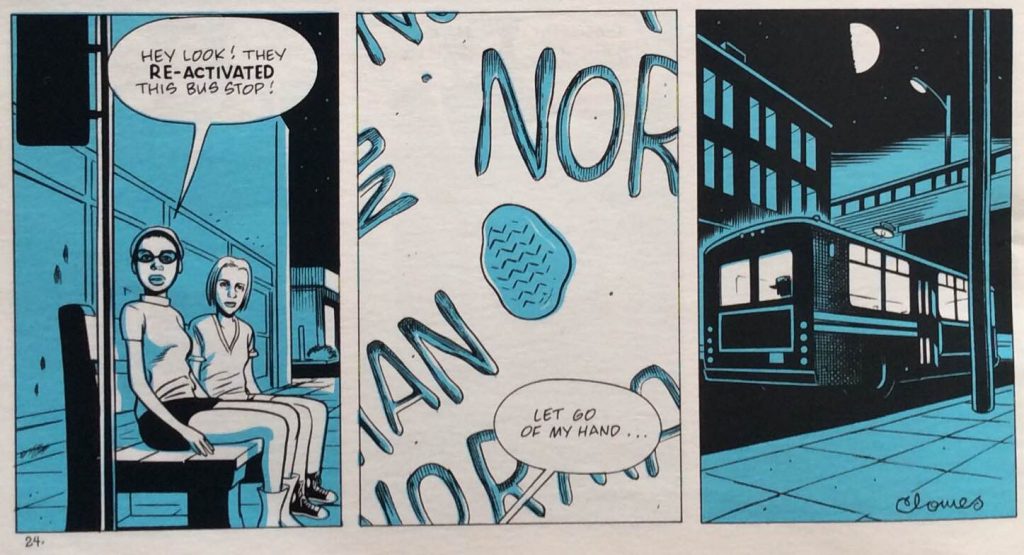
What is going on here? The women get more choices than Clowes’s men. From Clay Loudermilk to Daniel Pussey to David Boring the men inhabit this spectrum of sad indignities like Fate’s blind somnambulists. The women are operating on a more awakened level I think. Dan Clowes writes women so damn well that they overshadow the men they deal with on every page that they interact together. Why is this so? Is it because of feminism? Post modernism? Punk rock? What’s driving this?
The boys and men of Ghost World don’t stand a chance at outshining these women (which is why I personally balk at the movie adaptation giving a sexual role to the Bearded Windbreaker character. Oh come ON! I don’t care if it is Steve Buscemi, restore Brad Renfro’s impromptu blowjob please. Director’s cut. ‘Nuff said.)
Maybe one way we can understand what Clowes is getting at with all these astutely rendered female characters is getting back to the cosmic glue notion. Consider this quote I read in a diet book years ago, it really stuck with me:
‘Healthy yin energy is the stuff of relationships. Currently believed to be on expand mode, the universe courses up and through a woman, pulling both partners towards their primary connection with a larger whole. No wonder we got burned as witches.’1
Clowes’s career then can be seen as thus. He represents the quiet fire of the Ink Stud, using his male gaze to exalt ordinary women and ‘Ugly Girls’ in a way that Updike tried and spluttered at and Nabokov, in his born-in-1899 way, exquisitely failed (seriously, Charlotte Haze is a blow to middle-aged women everywhere). Comics-wise, women and their pesky bodies have openly been a preoccupation for cartoonists since the 1960’s (2). Womanly speaking, I don’t see much to relate to in the world of Robert Crumb or Chester Brown say, nor do I personally identify with the gorgeous cartoony chicks of the Hernandez universe. But Clowes’s women keep ringing true.
And maybe it’s because his male gaze isn’t wielded with a leer or as a controlling force – it’s a means of understanding.
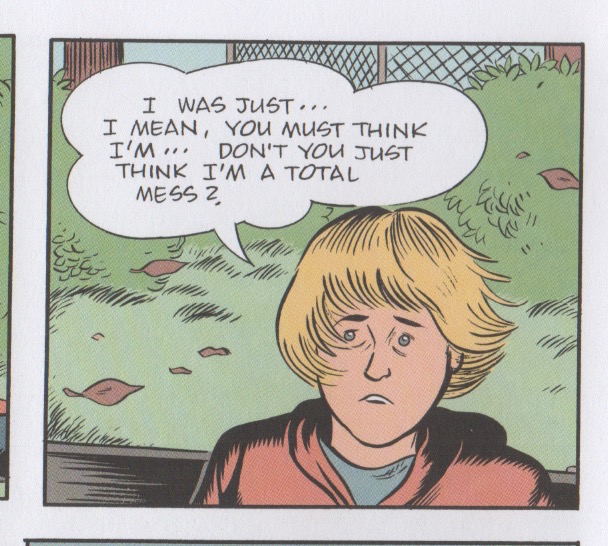
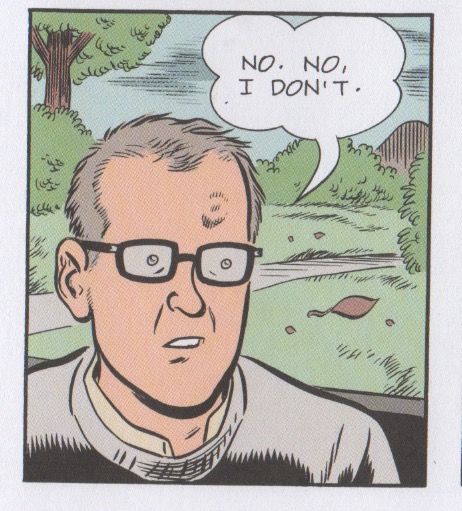
1 Jessica Porter, A Hip Chicks Guide to Macrobiotics, Penguin, 2004 p269
2 Well there’s George Grosz, he was pretty girl crazy too, but the Sixties is when it began to splurge out, right?
—————————————————————————————————
Sacha Mardou is a Brit making comics in St Louis, Missouri. Sky in Stereo is her most recent comic.
wow THANK YOU for this! i have loved dan clowes forever and tried for years to figure out why and how to justify the amount that his writing of female characters resonates so deeply and enduringly
Great article Sacha!
I would love to read your thoughts on Love and Rockets women
Gauntlet time! Ha!